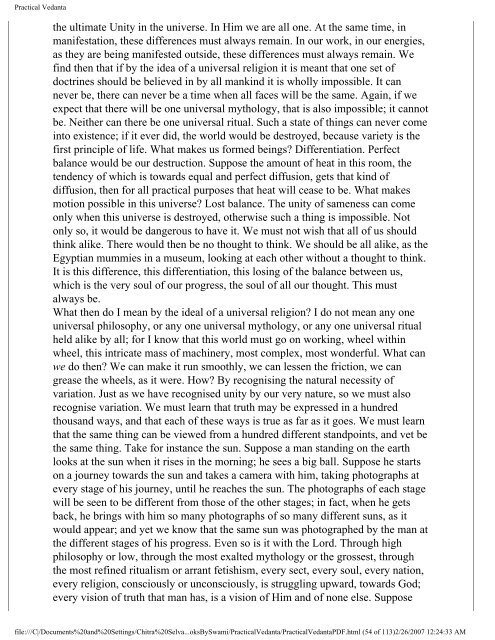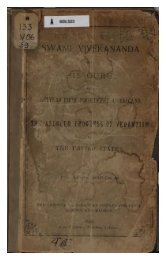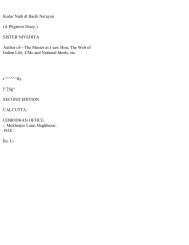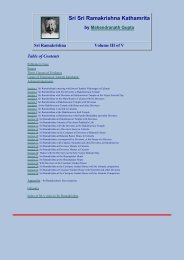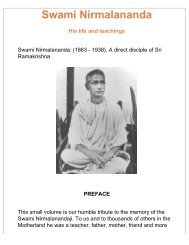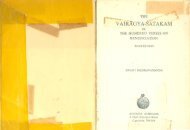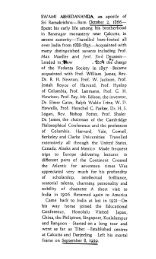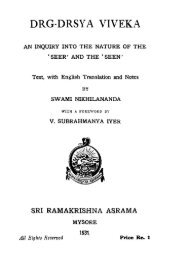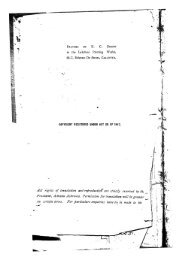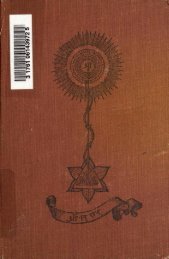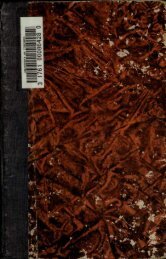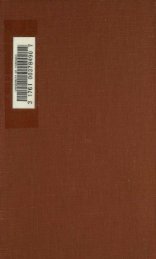<strong>Practical</strong> <strong>Vedanta</strong>the ultimate Unity in the universe. In Him we are all one. At the same time, inmanifestation, these differences must always remain. In our work, in our energies,as they are being manifested outside, these differences must always remain. Wefind then that if by the idea of a universal religion it is meant that one set ofdoctrines should be believed in by all mankind it is wholly impossible. It cannever be, there can never be a time when all faces will be the same. Again, if weexpect that there will be one universal mythology, that is also impossible; it cannotbe. Neither can there be one universal ritual. Such a state of things can never comeinto existence; if it ever did, the world would be destroyed, because variety is thefirst principle of life. What makes us formed beings? Differentiation. Perfectbalance would be our destruction. Suppose the amount of heat in this room, thetendency of which is towards equal and perfect diffusion, gets that kind ofdiffusion, then for all practical purposes that heat will cease to be. What makesmotion possible in this universe? Lost balance. The unity of sameness can comeonly when this universe is destroyed, otherwise such a thing is impossible. Notonly so, it would be dangerous to have it. We must not wish that all of us shouldthink alike. There would then be no thought to think. We should be all alike, as theEgyptian mummies in a museum, looking at each other without a thought to think.It is this difference, this differentiation, this losing of the balance between us,which is the very soul of our progress, the soul of all our thought. This mustalways be.What then do I mean by the ideal of a universal religion? I do not mean any oneuniversal philosophy, or any one universal mythology, or any one universal ritualheld alike by all; for I know that this world must go on working, wheel withinwheel, this intricate mass of machinery, most complex, most wonderful. What canwe do then? We can make it run smoothly, we can lessen the friction, we cangrease the wheels, as it were. How? By recognising the natural necessity ofvariation. Just as we have recognised unity by our very nature, so we must alsorecognise variation. We must learn that truth may be expressed in a hundredthousand ways, and that each of these ways is true as far as it goes. We must learnthat the same thing can be viewed from a hundred different standpoints, and vet bethe same thing. Take for instance the sun. Suppose a man standing on the earthlooks at the sun when it rises in the morning; he sees a big ball. Suppose he startson a journey towards the sun and takes a camera with him, taking photographs atevery stage of his journey, until he reaches the sun. The photographs of each stagewill be seen to be different from those of the other stages; in fact, when he getsback, he brings with him so many photographs of so many different suns, as itwould appear; and yet we know that the same sun was photographed by the man atthe different stages of his progress. Even so is it with the Lord. Through highphilosophy or low, through the most exalted mythology or the grossest, throughthe most refined ritualism or arrant fetishism, every sect, every soul, every nation,every religion, consciously or unconsciously, is struggling upward, towards God;every vision of truth that man has, is a vision of Him and of none else. Supposefile:///C|/Documents%20and%20Settings/Chitra%20Selva...oksBySwami/<strong>Practical</strong><strong>Vedanta</strong>/<strong>Practical</strong><strong>Vedanta</strong>PDF.html (54 of 113)2/26/2007 12:24:33 AM
<strong>Practical</strong> <strong>Vedanta</strong>we all go with vessels in our hands to fetch water from a lake. One has a cup,another a jar, another a bucket, and so forth, and we all fill our vessels. The waterin each case naturally takes the form of the vessel carried by each of us. He whobrought the cup has the water in the form of a cup; he who brought the jar — hiswater is in the shape of a jar, and so forth; but, in every case, water, and nothingbut water, is in the vessel. So it is in the case of religion; our minds are like thesevessels, and each one of us is trying to arrive at the realisation of God. God is likethat water filling these different vessels, and in each vessel the vision of Godcomes in the form of the vessel. Yet He is One. He is God in every case. This isthe only recognition of universality that we can get.So far it is all right theoretically. But is there any way of practically working outthis harmony in religions? We find that this recognition that all the various viewsof religion are true has been very very old. Hundreds of attempts have been madein India, in Alexandria, in Europe, in China, in Japan, in Tibet, and lastly inAmerica, to formulate a harmonious religious creed, to make all religions cometogether in love. They have all failed, because they did not adopt any practicalplan. Many have admitted that all the religions of the world are right, but theyshow no practical way of bringing them together, so as to enable each of them tomaintain its own individuality in the conflux. That plan alone is practical, whichdoes not destroy the individuality of any man in religion and at the same timeshows him a point of union with all others. But so far, all the plans of religiousharmony that have been tried, while proposing to take in all the various views ofreligion, have, in practice, tried to bind them all down to a few doctrines, and sohave produced more new sects, fighting, struggling, and pushing against eachother.I have also my little plan. I do not know whether it will work or not, and I want topresent it to you for discussion. What is my plan? In the first place I would askmankind to recognise this maxim, "Do not destroy". Iconoclastic reformers do nogood to the world. Break not, pull not anything down, but build. Help, if you can;if you cannot, fold your hands and stand by and see things go on. Do not injure, ifyou cannot render help. Say not a word against any man's convictions so far asthey are sincere. Secondly, take man where he stands, and from there give him alift. If it be true that God is the centre of all religions, and that each of us ismoving towards Him along one of these radii, then it is certain that all of us mustreach that centre. And at the centre, where all the radii meet, all our differenceswill cease; but until we reach there, differences there must be. All these radiiconverge to the same centre. One, according to his nature, travels along one ofthese lines, and another, along another; and if we all push onward along our ownlines, we shall surely come to the centre, because, "All roads lead to Rome". Eachof us is naturally growing and developing according to his own nature; each willin time come to know the highest truth for after all, men must teach themselves.What can you and I do? Do you think you can teach even a child? You cannot.The child teaches himself. Your duty is to afford opportunities and to removefile:///C|/Documents%20and%20Settings/Chitra%20Selva...oksBySwami/<strong>Practical</strong><strong>Vedanta</strong>/<strong>Practical</strong><strong>Vedanta</strong>PDF.html (55 of 113)2/26/2007 12:24:33 AM
- Page 1 and 2:
Practical VedantaPractical VedantaP
- Page 3 and 4: Practical Vedantaworld. If I am a s
- Page 5 and 6: Practical Vedantadifference is only
- Page 7 and 8: Practical VedantaThe ideal of faith
- Page 9 and 10: Practical Vedantamoment of our live
- Page 11 and 12: Practical Vedantaof the Christs and
- Page 13 and 14: Practical Vedanta"This life is Brah
- Page 15 and 16: Practical Vedantadark fifteen days,
- Page 17 and 18: Practical Vedantalife. This is the
- Page 19 and 20: Practical Vedantaeverything would b
- Page 21 and 22: Practical Vedantait is only through
- Page 23 and 24: Practical Vedantawhich is that subt
- Page 25 and 26: Practical Vedantanoumenon and pheno
- Page 27 and 28: Practical Vedantato which is the be
- Page 29 and 30: Practical VedantaAbsolute.The finit
- Page 31 and 32: Practical Vedantawhich is not the q
- Page 33 and 34: Practical Vedantaexperience that th
- Page 35 and 36: Practical Vedantafulfilled. The Jiv
- Page 37 and 38: Practical Vedantabetween the pure r
- Page 39 and 40: Practical Vedantacome out straight.
- Page 41 and 42: Practical Vedantawar with one anoth
- Page 43 and 44: Practical Vedantanobody could under
- Page 45 and 46: Practical VedantaMy idea, therefore
- Page 47 and 48: Practical Vedantathe same methods.
- Page 49 and 50: Practical Vedantavarious minds, all
- Page 51 and 52: Practical Vedantabrotherhood; but t
- Page 53: Practical Vedantabrotherhood, but w
- Page 57 and 58: Practical Vedantareason. What can y
- Page 59 and 60: Practical Vedantabeen preached in t
- Page 61 and 62: Practical Vedantathe husband kisses
- Page 63 and 64: Practical Vedantaof the knowledge a
- Page 65 and 66: Practical Vedantafor those who only
- Page 67 and 68: Practical Vedantasun exists because
- Page 69 and 70: Practical Vedantaof death was pleas
- Page 71 and 72: Practical VedantaGod. We must learn
- Page 73 and 74: Practical Vedantaa plague comes, it
- Page 75 and 76: Practical VedantaAtman? "As with a
- Page 77 and 78: Practical Vedantathat immortal One,
- Page 79 and 80: Practical Vedantaand the third egoi
- Page 81 and 82: Practical VedantaWitness of the uni
- Page 83 and 84: Practical VedantaPractical Vedanta1
- Page 85 and 86: Practical Vedantaeternal ; every ot
- Page 87 and 88: Practical Vedantafaculty, Buddhi, w
- Page 89 and 90: Practical VedantaPractical Vedanta1
- Page 91 and 92: Practical Vedantastepping-stone to
- Page 93 and 94: Practical Vedantarecognition? Findi
- Page 95 and 96: Practical Vedantasentient." This is
- Page 97 and 98: Practical Vedantaessentially differ
- Page 99 and 100: Practical Vedantaexistence is limit
- Page 101 and 102: Practical Vedantalive, for I am lif
- Page 103 and 104: Practical Vedantasee from Kapila's
- Page 105 and 106:
Practical Vedantalimitation, but th
- Page 107 and 108:
Practical Vedantaperfect, infinite,
- Page 109 and 110:
Practical Vedantaindividuality, of
- Page 111 and 112:
Practical Vedantarepeat [something]
- Page 113:
Practical Vedantaperson who dies in


